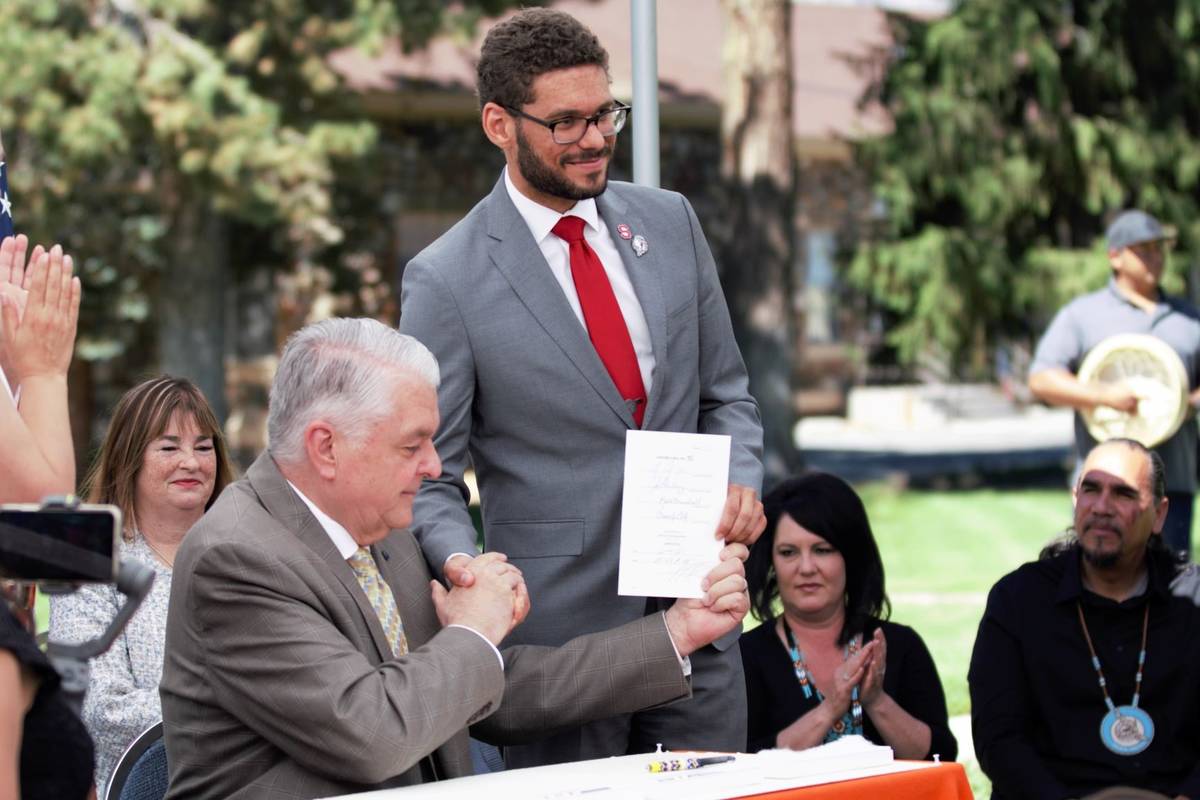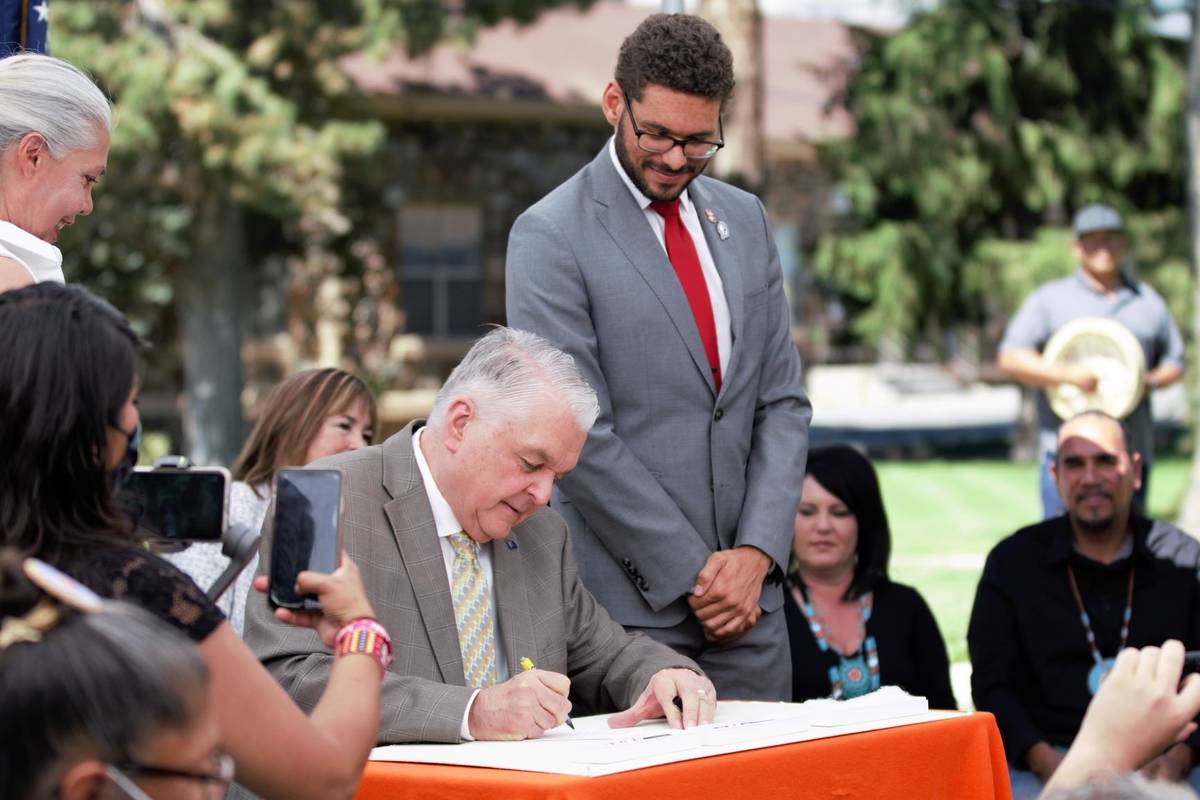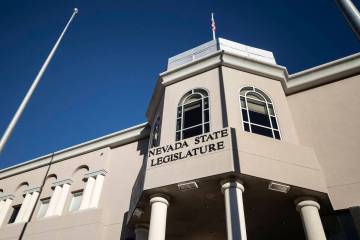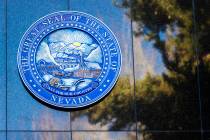Sisolak signs bills to help Native Americans in Nevada
CARSON CITY — Gov. Steve Sisolak on Friday signed a trio of bills that will “profoundly” affect Native Americans in the state, including waiving university fees for some native students and banning racially discriminatory school mascots and so-called sundown sirens.
Sisolak signed the bills during a ceremony Friday along with tribal leaders and elders on the grounds of Stewart Indian School in Carson City.
Assembly Bill 88 requires districts to adopt policies that prohibit schools from using any name, logo, mascot or other type of identifier considered racially discriminatory or that contains discriminatory language or imagery. The bill also tasks the Nevada State Board on Geographic Names with recommending changes to any place that has a name that includes derogatory terms.
“Our schools and public places should be places that embrace Nevada’s diverse population rather than perpetuating misrepresentations of any culture or group of people,” Sisolak said.
The new law also outlaws the use of any siren, bell or alarm that was previously used at specific times to signal when nonwhite people needed to leave town.
Tribal leaders and lawmakers believe that the new law will stop a siren that blares at 6 p.m. daily in Minden, a town some 20 minutes south of the state capital. In Douglas County, where Minden is, a “sundown ordinance” that required Native Americans to leave town by 6:30 p.m. stayed on the books until it was repealed in 1974. The siren still sounds each night.
“We know that there is a dark and troubled history in the past. I believe that by confronting these and working together to address them, we can all move forward, together and have a brighter future for the state,” the bill’s sponsor, Assemblyman Howard Watts, D-Las Vegas, said during Friday’s event.
Whether Minden will stop sounding the siren at 6 p.m. remains unclear, as the town continues to push back against the link between the siren and town’s “sundowner” past.
“At the end of the day, the argument stands true that our siren was never tied to an ordinance,” Minden Town Manager J.D. Frisby said Friday.
Frisby said that the decision will be up to the town board. He said that the board will need to discuss the next step and whether it wants to make a change or fight the law, which won’t go into effect until Oct. 1.
Benefits for Native Americans
Sisolak also signed two other bills that will affect Native Americans at the Friday ceremony.
Assembly Bill 262 requires the Nevada System of Higher Education to waive registration, per-credit and other fees that come with enrolling in one of the state’s universities for Native American students who are a member of one of Nevada’s 27 federally recognized tribes. Those students will have to also demonstrate that they are eligible to enroll and have lived in the state for at least a year.
Janet Davis, chairwoman of the Pyramid Lake Paiute Tribe, said “it will allow all of our kids to go to school.”
“A lot of the tribal kids do not want to be a burden on their parents. A lot of them come from economically disadvantaged families, and they feel that it’s a cost to their families and to their tribes to go to school,” Davis said.
Assembly Bill 270 ensures funding to preserve Stewart Indian School, which for nearly a century was operated as a federally run boarding school, a relic of a time when Indigenous children were taken from their families and forced to assimilate into white society.
Sisolak said the school grounds where the bill signing ceremony took place serve “as a sobering reminder to our nation’s history of forced assimilation.”
The three bills signed into law Friday “will profoundly change the quality of life” for members of the state’s 27 tribal nations, said Stacey Montooth, a citizen of the Walker River Paiute Nation and executive director of the Nevada Indian Commission.
“There’s never been a better time to be Indigenous and live in the state of Nevada,” Montooth said.
Watts, the Las Vegas assemblyman who sponsored the siren ban, noted that the three bills were just some of the laws passed this session aimed at recognizing and addressing the issues raised by Native Americans in the state.
One example is Assembly Bill 171, which Sisolak signed last week. That new law adds protections for a group of Rocky Mountain juniper trees known as “swamp cedars” within the 14,000-acre Bahsahwahbee Traditional Cultural Property in White Pine County, an area considered sacred to the Shoshone people.
“Taken together, this is a groundbreaking legislative session for advancing the rights and issues of indigenous people and fostering inclusion among all of us,” Watts said.
Contact Capital Bureau Chief Colton Lochhead at clochhead@reviewjournal.com. Follow @ColtonLochhead on Twitter.






























